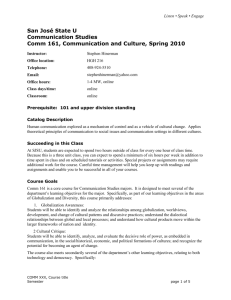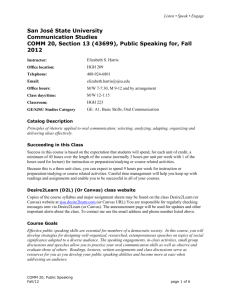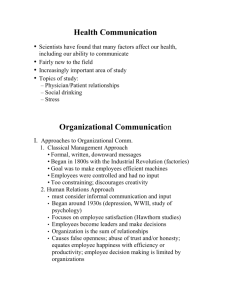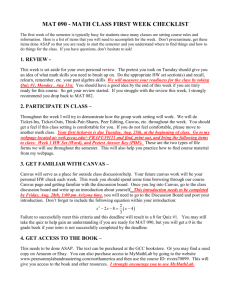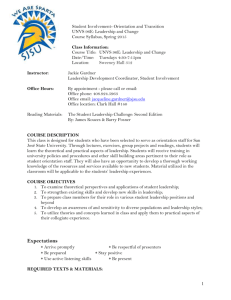San José State University Communication Studies 198, Applied
advertisement
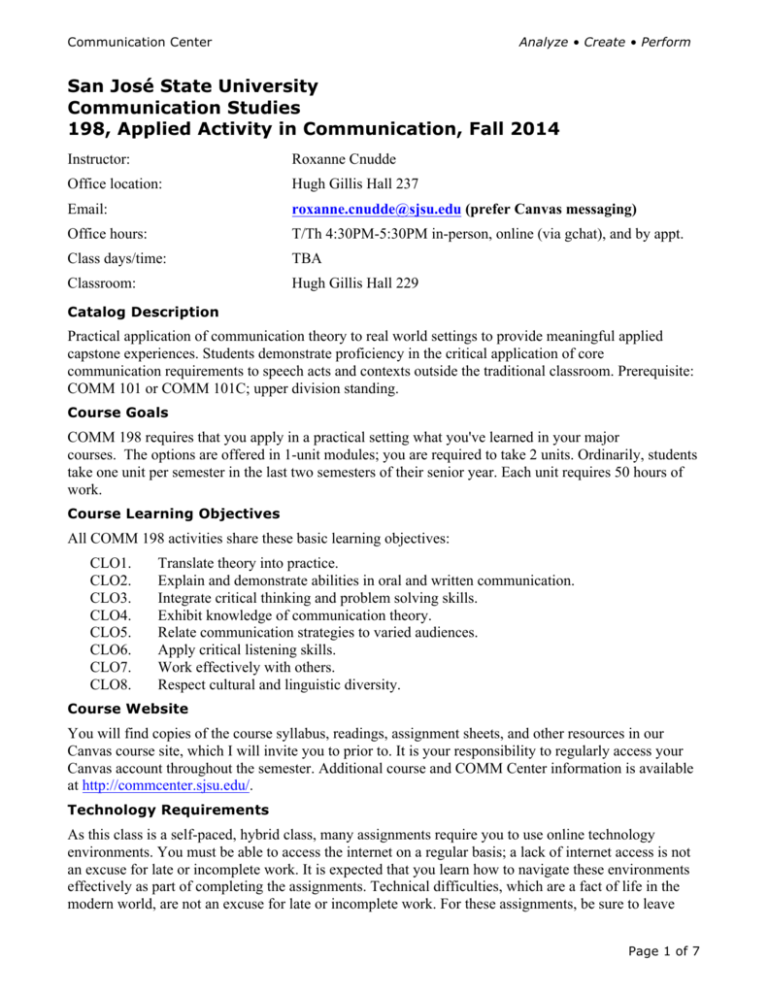
Communication Center Analyze • Create • Perform San José State University Communication Studies 198, Applied Activity in Communication, Fall 2014 Instructor: Roxanne Cnudde Office location: Hugh Gillis Hall 237 Email: roxanne.cnudde@sjsu.edu (prefer Canvas messaging) Office hours: T/Th 4:30PM-5:30PM in-person, online (via gchat), and by appt. Class days/time: TBA Classroom: Hugh Gillis Hall 229 Catalog Description Practical application of communication theory to real world settings to provide meaningful applied capstone experiences. Students demonstrate proficiency in the critical application of core communication requirements to speech acts and contexts outside the traditional classroom. Prerequisite: COMM 101 or COMM 101C; upper division standing. Course Goals COMM 198 requires that you apply in a practical setting what you've learned in your major courses. The options are offered in 1-unit modules; you are required to take 2 units. Ordinarily, students take one unit per semester in the last two semesters of their senior year. Each unit requires 50 hours of work. Course Learning Objectives All COMM 198 activities share these basic learning objectives: CLO1. CLO2. CLO3. CLO4. CLO5. CLO6. CLO7. CLO8. Translate theory into practice. Explain and demonstrate abilities in oral and written communication. Integrate critical thinking and problem solving skills. Exhibit knowledge of communication theory. Relate communication strategies to varied audiences. Apply critical listening skills. Work effectively with others. Respect cultural and linguistic diversity. Course Website You will find copies of the course syllabus, readings, assignment sheets, and other resources in our Canvas course site, which I will invite you to prior to. It is your responsibility to regularly access your Canvas account throughout the semester. Additional course and COMM Center information is available at http://commcenter.sjsu.edu/. Technology Requirements As this class is a self-paced, hybrid class, many assignments require you to use online technology environments. You must be able to access the internet on a regular basis; a lack of internet access is not an excuse for late or incomplete work. It is expected that you learn how to navigate these environments effectively as part of completing the assignments. Technical difficulties, which are a fact of life in the modern world, are not an excuse for late or incomplete work. For these assignments, be sure to leave Page 1 of 7 Communication Center Analyze • Create • Perform yourself time to learn the technology so that you can successfully post your work. If you encounter technical difficulties that you cannot solve, please contact the COMM Center and/or the University Help Desk: http://www.sjsu.edu/helpdesk/. Again, leave yourself enough time to troubleshoot unexpected (and inevitable) technical problems before the assignment comes due. Assignments and Grading Policies Detailed instructions for all assignments can be found on our CANVAS course website. Additionally, questions may be directed to COMM Center faculty, whose specific roles will be described during training. General Information Shifts Hours: You must check-in with the faculty member on shift. Faculty will note your arrival and departure and your hours will be tracked and updated every week on your Canvas. Missing/Making up Shifts: If you anticipate missing a shift please post to the discussions in Canvas to look for someone to cover for you at least 2 weeks in advance. If you cannot find a replacement please let Roxanne know via email at least 3 days prior to the missed shift. Position Descriptions Coaches The COMM Center Coach option is the first tier 198 option available through the Center. Its purpose is to provide Communication Studies majors with practical experience, under faculty supervision, with scholarly application and reflection. The COMM Center Coach option provides students with an opportunity to serve the campus community by working with students from all majors, ethnic, cultural and linguistic backgrounds. It is more than just staffing the COMM Center; it is an opportunity to serve as a peer Coach to assist students in the completion of assignments, self-paced instructional modules, speech practice and evaluation, or drop-in coaching assistance. COMM Center coaches are a vital part of the department’s offerings by providing support and enrichment for students in the basic oral communication courses, any courses in the Communication Studies department, and for any student on campus wishing to enhance their oral communication skills for academic, personal, or professional development. Assignment Evaluation Training (10 hours) Credit/No Credit Weekly Reflections (12 total) Credit/No Credit Tutoring (3 hours per week) (36 hours) Credit/No Credit Online Midterm Discussion (1 hour) Credit/No Credit Final Meeting and Reflection (1 hour) Credit/No Credit Coaches must staff the Center three hours per week and complete weekly reflections on CANVAS; failure to complete more than 3 reflections will result in a no credit. You are responsible for arranging a substitute for any missed shift (using the CANVAS discussions), and all missed hours must be made up by agreement with the director. Make-up hours may result in an alternative assignment. Ongoing discussions, training regarding pedagogy, and procedural updates will be communicated through CANVAS; it is imperative that you check the space and participate in discussion frequently (i.e. Page 2 of 7 Communication Center Analyze • Create • Perform weekly). A “credit” in all 5 assignment categories is required to earn a Credit for this course. Coaches are encouraged to apply for and advance to a Mentor position for their second unit of 198. Secondsemester Coaches must complete a 4-hour semester project to be approved by Roxanne (due by and presented at the final meeting). Mentors The COMM Center Mentor option is the second-tier 198 option through the Center; in most cases Mentors have served as a Coach. Mentors are partnered with a COMM Center faculty member and (in some cases) another experienced Mentor to develop and present COMM Center workshops. Assignment Evaluation Training (10 hours) Credit/No Credit Develop and facilitate 3 workshops Credit/No Credit Tutoring (1.5 hours per week) (19.5 hours) Credit/No Credit Final Meeting and Reflection Credit/No Credit Mentors staff the Center one and a half hours per week; this time is aimed at mentoring Coaches and providing them with feedback about their interactions with student-clients. This time is also used to develop three separate workshops that you will present. You are responsible for arranging a substitute for any missed shifts (using the CANVAS discussions), and all missed hours must be made up by agreement with the director. Make-up hours may result in an alternative assignment. Ongoing discussions, training regarding pedagogy, and procedural updates will be communicated through CANVAS; it is imperative that you check the space and participate in discussions frequently. You should also maintain regular contact with your assigned faculty member and your mentee Coaches. A “credit” in all assignment categories is required to earn a Credit for this course. Peer Advisors Peer Advisors provide basic information for current and prospective COMM majors and minors about courses, requirements, and potential pathways through the major best suited for students. They are trained to provide accurate information, helping to publicize important information such as the WST, COMM 198, etc. and help foster understanding of student pathways through the major. This position will afford the student advisor a great opportunity to gain not just experience in advising, but in developing leadership qualities and the ability to locate, process, and explain information. Peer Advisors have excellent interpersonal communication skills and a high degree of integrity as they are in a unique position to offer first-hand experience with the department and suggestions for success. This is a great position for those looking to move into graduate school and academic counseling. Assignment Evaluation Training (9 hours) Credit/No Credit Recruitment and program support (8 hours) Credit/No Credit Weekly shift (2.5 hours per week) (32.5) Credit/No Credit Final Meeting and Reflection Credit/No Credit Page 3 of 7 Communication Center Analyze • Create • Perform Writing Consultants This course has two primary objectives: to instruct students in writing pedagogy and to support the further advancement of students’ writing. Consultants work as writing consultants primarily with upperlevel writing students enrolled in 100W and undertake a semester project that involves taking their writing to the next level. Students also have the option of fulfilling course hours by serving on the editorial staff of the The Bolt. Consultants participate in the COMM Center Training Program that involves learning theoretical approaches to teaching writing with an emphasis on cognitive apprenticeship. The training addresses safety, cultural sensitivity, team building, and tutoring protocol. At the beginning of the semester, consultants conference individually with their 198 instructor to decide on their semester writing projects. A semester writing project must deepen the student’s writing practice. Consultants will meet throughout the semester online or in person to discuss progress on their project and their tutoring experiences. The course’s Canvas shell offers the primary interface for these meetings and discussions. Consultants are expected to spend a minimum of eighteen hours per semester working with SJSU students, through in-person and online appointments. These hours are primarily fulfilled through a weekly 1.5-hour shift in the COMM Center. Consultants also may fulfill tutoring hours by working with 100W instructors to assist in teaching a lesson, such as in-class peer reviews, or by assisting with a writing-focused workshop in the COMM Center. Consultants are required to send a feedback report for every tutoring session. The feedback report must be sent to the student, her/his instructor, and Professor Peck. Consultants must keep an accurate account of their hours throughout the semester by using the course timesheet spreadsheet. Credit for this course is contingent on turning in the timesheet during the final meeting at the end of the semester. Assignment Evaluation Training (10 hours) Credit/No Credit Semester project / The Bolt staff (18 hours) Credit/No Credit Tutoring (18 hours) Credit/No Credit Meetings & Discussions (4 hours) Credit/No Credit Fall 2014 Schedule For up-to-date information see your COMM 198 CANVAS homepage. Date Monday, August 25 Monday, September 1 Friday, September 5 Description Fall Semester Begins Labor Day Observed—Campus Closed Training Day 1 (times TBA) Attendance to both sessions is required Assignments/Duties See CANVAS for readings and assignments Page 4 of 7 Communication Center Analyze • Create • Perform Last Day to Drop Courses Monday, September 8 COMM Center Opening Day (Regular open hours: Monday – Thursday 10:30a-4:30p October 13-24 Training Day 2 (times TBA) Attendance to both sessions is required Last Day to Add Courses & Register Late Midterm Discussions Tuesday, November 11 Veteran’s Day—Campus Closed Thursday, November 27 and 28 Thursday, December 4 Thanksgiving holiday—Campus Closed Thursday, December 11 Final Meeting, 11:00AM-12:00PM Attendance required Friday, September 12 COMM Center Closes for Semester Shifts begin; be ready to lead COMM 80 orientation See CANVAS for readings and assignments See CANVAS No shifts during this holiday No shifts during this holiday Final day of shifts Final Reflections, time sheets, or projects due (See Canvas) Page 5 of 7 Communication Center Analyze • Create • Perform Student Resources Library Liaison The Communication Studies Department encourages vigorous and ethical research as part of information literacy for all of its students. For assistance in the library go to the King Library Reference Desk (2nd floor; 408-808-2100) and/or utilize the Communication Research Guide available at http://libguides.sjsu.edu/communication. Student Technology Resources Computer labs for student use are available in the new Academic Success Center located on the 1st floor of Clark Hall and on the 2nd floor of the Student Union. In addition, computers are available in the Martin Luther King Library. A wide variety of audio-visual equipment is available for student checkout from Media Services located in IRC 112. These items include digital and VHS camcorders, VHS and Beta video players, 16 mm, slide, overhead, DVD, CD, and audiotape players, sound systems, wireless microphones, screens and monitors. Learning Assistance Resource Center The Learning Assistance Resource Center is designed to assist students in the development of their full academic potential and to motivate them to become self-directed learners. The center provides support services, such as skills assessment, individual or group tutorials, subject advising, learning assistance, summer academic preparation and basic skills development. The Learning Assistance Resource Center is located in Room 600 in the Student Services Center. SJSU Writing Center The Writing Center in Clark Hall 126 offers tutoring services to San Jose State students in all courses. Writing Specialists assist in all areas of the writing process, including grammar, organization, paragraph development, coherence, syntax, and documentation styles. For more information, visit the Writing Center website at http://www.sjsu.edu/writingcenter or call 924-2308. Academic Counseling Center for Excellence in the Social Sciences (ACCESS) Clark Hall Room 240, 924-5363, socsci-access@sjsu.edu Dr. Hien Do, Faculty Director, Hien.Do@sjsu.edu, 924-5461 Valerie Chapman, Academic Advisor, Valerie.Chapman@sjsu.edu, 924-5364 All COSS students and interested students are invited to stop by the Center for general education advising, help with changing majors, academic policy related questions, meeting with peer advisors, and/or attending various regularly scheduled presentations and workshops. Call or email for an appointment, or just stop by. Veterans We are honored to have you on campus and look forward to your continued success here. For some returning veterans, coming back to school may present unique challenges; if that is true for you, remember that you do not have to face these challenges on your own. Please feel free to discuss any questions or concerns you may have about the course, assignments, or your academic program with me. Veteran services are also available to you: http://www.sjsu.edu/registrar/veterans/ and http://www.sjsu.edu/vital/. Thank you for your service and welcome home! University Policies Academic integrity Your own commitment to learning, as evidenced by your enrollment at San José State University, and the University’s Academic Integrity Policy requires you to be honest in all your academic course work. Page 6 of 7 Communication Center Analyze • Create • Perform Faculty members are required to report all infractions to the Office of Student Conduct and Ethical Development. The policy on academic integrity can be found at the Office of Student Conduct and Ethical Development web site at http://sa.sjsu.edu/student_conduct You should, therefore, submit your own, original work for this course. I will uphold San José State University’s policy on academic honesty. Consequently, an instance of academic misconduct (e.g., plagiarism, cheating, taking credit for others’ work, submitting work for another course as work for this one, etc.) will likely result in a failing course grade. Campus Policy in Compliance with the Americans with Disabilities Act If you need course adaptations or accommodations because of a disability, or if you need to make special arrangements in case the building must be evacuated, please make an appointment with me as soon as possible, or see me during office hours. Presidential Directive 97-03 at http://www.sjsu.edu/president/docs/directives/PD_1997-03.pdf requires that students with disabilities requesting accommodations must register with the Accessible Education Center (AEC) at http://www.drc.sjsu.edu/ to establish a record of their disability. Consent for Recording of Class and Public Sharing of Instructor Material Common courtesy and professional behavior dictate that you notify someone when you are recording him/her. You must obtain the instructor’s permission to make audio or video recordings in this class. Such permission allows the recordings to be used for your private, study purposes only. The recordings are the intellectual property of the instructor; you have not been given any rights to reproduce or distribute the material. Course material developed by the instructor is the intellectual property of the instructor and cannot be shared publicly without his/her approval. You may not publicly share or upload instructor-generated material for this course such as exam questions, lecture notes, or homework solutions without instructor consent. Dropping and Adding Students are responsible for understanding the policies and procedures about add/drop and grade forgiveness. Refer to the current semester’s Catalog Policies section at http://info.sjsu.edu/static/catalog/policies.html. Add/drop deadlines can be found on the current academic year calendars document on the Academic Calendars webpage at http://www.sjsu.edu/provost/services/academic_calendars/. The Late Drop Policy is available at http://www.sjsu.edu/aars/policies/latedrops/policy/. Students should be aware of the current deadlines and penalties for dropping classes. Information about the latest changes and news is available at the Advising Hub at http://www.sjsu.edu/advising/ Page 7 of 7
